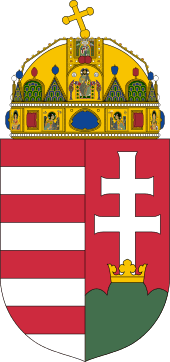Hungarian parliamentary election, 1926
 |
| This article is part of a series on the politics and government of Hungary |
| Foreign relations |
Parliamentary elections were held in Hungary between 8 and 15 December 1926.[1] The result was a victory for the Unity Party, which won 161 of the 245 seats in Parliament. István Bethlen remained Prime Minister.[2]
Electoral system
Prior to the election the electoral system was changed again. In the previous elections there had been 219 constituencies, of which 195 were openly-elected single-member constituencies, 20 of which were secretly-elected single-member constituencies, and four of which were secretly-elected multi-member constituencies.[3] For this election there were 199 openly-elected single-member constituencies and 11 secretly-elected multi-member constituencies electing a total of 46 seats.[4][5]
Results
| Party | SMCs | MMCs | Total | |||||||
|---|---|---|---|---|---|---|---|---|---|---|
| Votes[a] | % | Seats | Votes[b] | % | Seats | Votes | % | Seats | +/– | |
| Unity Party | 389,529 | 50.3 | 150 | 92,557 | 25.0 | 11 | 482,086 | 42.2 | 161 | +21 |
| Christian National Economic Party | 100,492 | 13.0 | 25 | 74,783 | 20.2 | 10 | 175,275 | 15.3 | 35 | New |
| Hungarian Social Democratic Party | 18,903 | 2.4 | 0 | 107,921 | 29.2 | 14 | 126,824 | 11.1 | 14 | –11 |
| Unofficial Unity Party candidates | 97,474 | 12.6 | 9 | – | – | – | 97,474 | 8.5 | 9 | New |
| United Left (FKFPP–NDP) | 20,439 | 2.6 | 0 | 69,693 | 18.9 | 9 | 90,132 | 7.9 | 9 | +2 |
| Hungarian National Independence Party | 22,428 | 2.9 | 1 | 20,835 | 5.6 | 1 | 43,263 | 3.8 | 2 | New |
| Agrarian Party | 16,355 | 2.1 | 3 | – | – | – | 16,355 | 1.4 | 3 | New |
| Independence and '48 Kossuth Party | 9,848 | 1.3 | 0 | 3,716 | 1.0 | 1 | 13,564 | 1.2 | 1 | 0 |
| Independent '48 Smallholders Party | 9,963 | 1.3 | 0 | – | – | – | 9,963 | 0.9 | 0 | New |
| Hungarian Agricultural Labourers and Workers Party | 4,317 | 0.6 | 0 | – | – | – | 4,317 | 0.4 | 0 | New |
| Hungarian National Socialist Party | 1,118 | 0.1 | 0 | – | – | – | 1,118 | 0.1 | 0 | New |
| National Party of the Lower-Middle Class | – | – | 1 | – | – | – | – | – | 1 | New |
| Independents | 83,148 | 10.7 | 10 | – | – | – | 83,148 | 7.3 | 10 | –16 |
| Invalid/blank votes | 0 | – | – | 10,474 | – | – | 10,474 | – | – | – |
| Total | 774,014 | 100 | 199 | 379,979 | 100 | 46 | 1,153,993 | 100 | 245 | 0 |
| Registered voters/turnout | 986,165 | 78.5 | – | 518,062 | 73.3 | – | 1,504,227[c] | 76.0 | – | – |
| Source: Nohlen & Stöver | ||||||||||
a The number of votes refers to only 109 of the 199 single-member constituencies as 90 seats were uncontested.[4]
b The number of votes refers to ten of the eleven MMCs as one constituency was uncontested.[4]
c The total number of registered voters was 2,231,972; the figure in the table refers to the number of registered voters in the contested seats.[4]